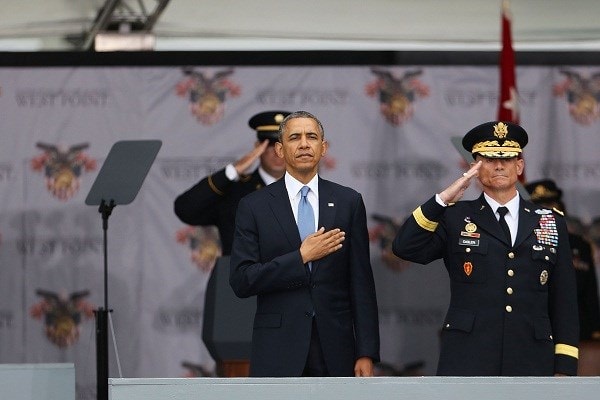"US President strongly supports Vietnam on the East Sea issue"
According to experts, US President Barack Obama's stance on the East Sea issue is very clear and strong, when the White House owner declared his support for ASEAN and criticized China for its aggressive actions in this region, after illegally sending the Haiyang Shiyou 981 drilling rig and many military ships into Vietnam's waters.
According to experts, US President Barack Obama's stance on the East Sea issue is very clear and strong, when the White House owner declared his support for ASEAN and criticized China for its aggressive actions in this region, after illegally sending the Haiyang Shiyou 981 drilling rig and many military ships into Vietnam's waters.
In a speech on general foreign policy on May 28, Mr. Obama warned that world instability, if not resolved, could threaten US allies and eventually force the US to mobilize troops.
 |
| US President Barack Obama salutes the flag before speaking at the US Military Academy at West Point (Source: Getty Images) |
“Even if tensions are only regional, such as in southern Ukraine or in the East Sea, if left unchecked, they will impact our allies and our military will have to step in,” Mr. Obama said to the graduating officers of the US Military Academy at West Point (New York) and were broadcast live on many television channels in the US.
Later, Mr. Obama also affirmed that "the US supports ASEAN countries in the process of negotiating a Code of Conduct (COC) with China in maritime sovereignty disputes in the East Sea, and is taking action to resolve this dispute through international law."
Speaking to a VNA reporter in Washington DC, Professor Nguyen Manh Hung, majoring in International Relations at George Mason University, said that the US government's stance on the East Sea issue is clear and should be placed in the context of the Obama administration's continuous concern over China's actions.
“We must understand that this is not a speech focused on any country or China, and Mr. Obama said that enough when referring to the Code of Conduct and the basis of international law. Recently, a series of officials at all levels of the US government have raised the issue of China's actions being aggressive and provocative, which I think is very strong,” Professor Nguyen Manh Hung assessed.
Gregory Poling, an Asia expert at the Washington DC-based Center for Strategic and International Studies (CSIS), has a similar view, saying that President Obama does not need to focus on any specific issue, whether it is Syria, Iran, or Ukraine, to send a strong message regarding tensions in the East Sea.
“President Obama cannot specifically talk about diplomatic solutions or legal issues in front of the newly graduated officers, but I think the message sent here about the East Sea issue is strong. The President talked about the role of the Code of Conduct in the East Sea, and for the first time mentioned the important role of the United Nations Convention on the Law of the Sea,” Mr. Poling told VNA reporters.
“President Obama was also very skillful in using words to send a message that the US can intervene militarily when necessary, that is when he said that the current tensions in Ukraine or the East Sea are not at a level that requires the US to mobilize troops, but if it reaches a dangerous threshold where the interests of the US or its allies are threatened, then that is inevitable.”
In his speech, President Obama also called on the US Congress to ratify the United Nations Convention on the Law of the Sea, saying that the approval by the US legislature would make it easier for the US government to call on China to act in accordance with this Convention.
President Obama chose the moment to talk about US foreign policy at a time when there is much criticism of US passivity in the face of world issues, arguing that “leading from behind” will inevitably lead to US failure, and many regions in the world are becoming particularly tense, requiring an active role for the US.
Expert Gregory Poling said that up to this point, the US has strongly supported Vietnam in the face of tensions in the East Sea, while Professor Nguyen Manh Hung said that how specifically the US will support Vietnam depends on the results of the visit to the US by Vietnamese Deputy Prime Minister and Foreign Minister Pham Binh Minh at the invitation of US Secretary of State John Kerry./.
According to VNA






